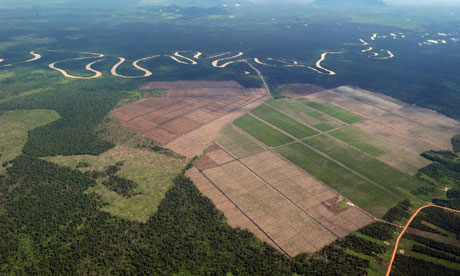
Five years ago very few people in the UK would have heard of the Rainforest Alliance. Today it would be difficult to walk down any high street, visit a supermarket or go into your corner shop without being confronted by the green frog seal that shows the contents of a product comes from Rainforest Alliance Certified™ farms.
Consumers spend over $12bn (£7.3bn) per year on Rainforest Alliance Certified™ products around the world and there is now more than 708,200 hectares of farmland under our certification, covering 2.6% of the global coffee market and 3.2% of global tea production as well as many other commodities.
This step change in the profile and presence of Rainforest Alliance Certified™ products, is not as a result of a huge marketing campaign but a response by some of the world's leading businesses to growing and continuing consumer demand for sustainability and transparency; coupled with a realisation among many that they simply have to do business differently.
Of course the adoption by many of the biggest brands of sustainability practices through the certification programme has not been without its critics who have questioned whether such large global businesses can really take the sustainability agenda forward or are simply guilty of greenwashing.
But there is a simple and stark reality for anyone who is serious about sustainability on a global scale. Many experts point out that there is a key tipping point for leveraging sustainability on the scale required. Between 300 and 500 large companies control 70% or more of the world trade in the 15 global commodities that have the largest environmental and social footprint, including wood and wood fibre, coffee and cocoa beans, tea, and palm oil. When large companies source commodities from farms, estates, forests and plantations who have grown and harvested crops sustainably it can create economies of scale providing huge positive environmental and social benefits.
Companies depend upon millions of small holders around the world to supply them. So a company's sustainability performance in this area is only as good as the on the ground practices of those millions of small holders and the community-owned cooperatives to which many of them belong. With 1 billion farmers in the world, and 2 billion people whose livelihoods depend upon natural resources, sustainability at this level is essential. And it makes the need for the development of sustainability to be a highly decentralised and locally disaggregated proposition an essential requirement of any company's strategy. It has to be built, literally, from the ground up, with tools and practices that make private companies, governments and NGOs work together with communities and smallholders to improve practices and impacts, and gain access to markets.
Consumers are also preferring sustainably produced goods. Any CEO, director or senior manager who does not take sustainability seriously is risking the future viability of their company.
Tensie Whelan is the president of the Rainforest Alliance
This content is brought to you by Guardian Professional. Become a GSB member to get more stories like this direct to your inbox




.jpg?w=600)


